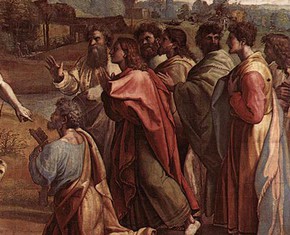The views expressed in our content reflect individual perspectives and do not represent the authoritative views of the Baha'i Faith.
[Editor’s Note: This is the ninth installment of a multi-part essay called “Questions from a Clergyman”. Click here to read from the beginning.]
One question I got used to hearing from Christians — one that I had issued myself before I became more deeply acquainted with Baha’u’llah and His teachings — was this:
“How do you respond to the accusation that Baha’u’llah is a false prophet?”
This diplomatic wording came from a home town pastor (I’m calling him Dan) at one of the Cult Night gatherings about which I’ve been blogging. I found the answer in this passage:
Therefore all things whatsoever ye would that men should do to you, do ye even so to them: for this is the law and the prophets. Enter ye in at the strait gate: for wide is the gate, and broad is the way, that leadeth to destruction, and many there be which go in thereat: Because strait is the gate, and narrow is the way, which leadeth unto life, and few there be that find it.
Beware of false prophets, which come to you in sheep’s clothing, but inwardly they are ravening wolves. Ye shall know them by their fruits. Do men gather grapes of thorns, or figs of thistles? Even so every good tree bringeth forth good fruit; but a corrupt tree bringeth forth evil fruit. A good tree cannot bring forth evil fruit, neither can a corrupt tree bring forth good fruit. Every tree that bringeth not forth good fruit is hewn down, and cast into the fire. Wherefore by their fruits ye shall know them. – Matthew 7:12-20.
Jesus speaks of the “fruits” that serve as a hallmark of a true or false prophet earlier in the verse. What sort of fruits would a true prophet show besides upholding the “Golden Rule” and bidding men do likewise? The Apostle Paul sheds some light on this in his dissertation on love in I Corinthians 13:1-3:
Though I speak with the tongues of men and of angels, but have not love, I have become sounding brass or a clanging cymbal. And though I have the gift of prophecy, and understand all mysteries and all knowledge, and though I have all faith, so that I could remove mountains, but have not love, I am nothing. And though I bestow all my goods to feed the poor, and though I give my body to be burned, but have not love, it profits me nothing.
This dissertation places love above faith and above all miracles and above all doctrine. But it still indicates the value of these “fruits”: prophecy, knowledge, faith, charity, generosity, sacrifice … and above all, love.
 Jesus states that good fruit cannot come from a bad tree, and asks: “If Satan casts out Satan, he is divided against himself. How then will his kingdom stand?” (Matt: 12:26) Then he reiterates in verse 31 that a tree is known by its fruit. If we were not capable of judging someone by their fruits, why would the Lord of all mankind tell us that we were?
Jesus states that good fruit cannot come from a bad tree, and asks: “If Satan casts out Satan, he is divided against himself. How then will his kingdom stand?” (Matt: 12:26) Then he reiterates in verse 31 that a tree is known by its fruit. If we were not capable of judging someone by their fruits, why would the Lord of all mankind tell us that we were?
We can use the criteria given by Christ, Himself, to judge the fruits of Baha’u’llah’s teachings. We can read for ourselves the various ways Baha’u’llah teaches the same set of virtues that Christ taught. He also gives love the priority:
The fundamental purpose animating the Faith of God and His Religion is to safeguard the interests and promote the unity of the human race, and to foster the spirit of love and fellowship amongst men. – Tablets of Baha’u’llah, p. 168.
Love and unity are the core of Baha’u’llah’s teachings. Baha’u’llah not only testifies to the truth of Christ and reiterates His teachings, but glorifies Him, with words like these:
Know thou that when the Son of Man yielded up His breath to God, the whole creation wept with a great weeping. By sacrificing Himself, however, a fresh capacity was infused into all created things. Its evidences, as witnessed in all the peoples of the earth, are now manifest before thee. The deepest wisdom which the sages have uttered, the profoundest learning which any mind hath unfolded, the arts which the ablest hands have produced, the influence exerted by the most potent of rulers, are but manifestations of the quickening power released by His transcendent, His all-pervasive, and resplendent Spirit.
We testify that when He came into the world, He shed the splendor of His glory upon all created things. – Gleanings from the Writings of Baha’u’llah, p. 85.
Millions of people around the world, from every ethnicity and class and background and Faith and nation, follow Baha’u’llah and call themselves Baha’is. And Baha’is revere Christ and all of the founders of the world’s great Faiths, believing that those Manifestations of God taught the same basic truth of love.
Read the next article in the series: Won’t the Dead Rise Again?
Read the previous article in the series: Focusing on the Word of God
















Comments
Sign in or create an account
Continue with Googleor